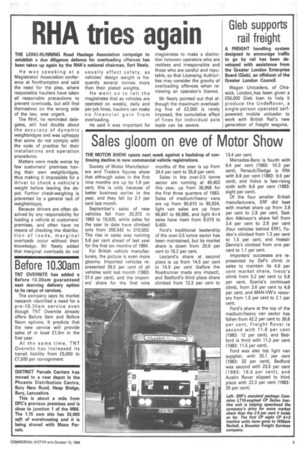RHA tries again
Page 7

If you've noticed an error in this article please click here to report it so we can fix it.
THE LONG-RUNNING Road Haulage Association campaign to establish a due diligence defence for overloading offences has been taken up again by the RHA's national chairman, Bert Neely.
He was speaking at a Magistrates' Association conference at Northampton and said the need for the plea, where responsible hauliers have taken all reasonable precautions to prevent overloads, but still find themselves on the wrong side of the law, was urgent.
The RHA, he reminded delegates, still had doubts about the accuracy of dynamic weighbridges and was uphappy that some do not comply with the code of practice for their installations and operation procedures.
Matters were made worse by few customers' premises having their own weighbridges, thus making it impossible for a driver to check a vehicle's weight before leaving the depot. Further check-weighing is prevented by a general lack of weighbridges.
Because drivers are often absolved by any responsibility for loading a vehicle at customers' premises, and often have no means of checking the distribution of loads, marginal overloads occur without their knowledge. Mr Neely added that marginal overloads do not usually affect safety, as vehicles' design weight is frequently several tonnes more than their plated weights.
He went on to tell the magistrates that as vehicles are operated on weekly, daily and per-job hires, hauliers can make no financial gain from overloading.
He said it was important for magistrates to make a distinction between operators who are reckless and irresponsible and those who are careful and reputable, so that Licensing Authorities may consider the gravity of overloading offences when reviewing an operator's licence.
Mr Neely pointed out that although the maximum overloading fine of £2,000 is rarely imposed, the cumulative effect of fines for individual axle loads can be severe.
















































































































































